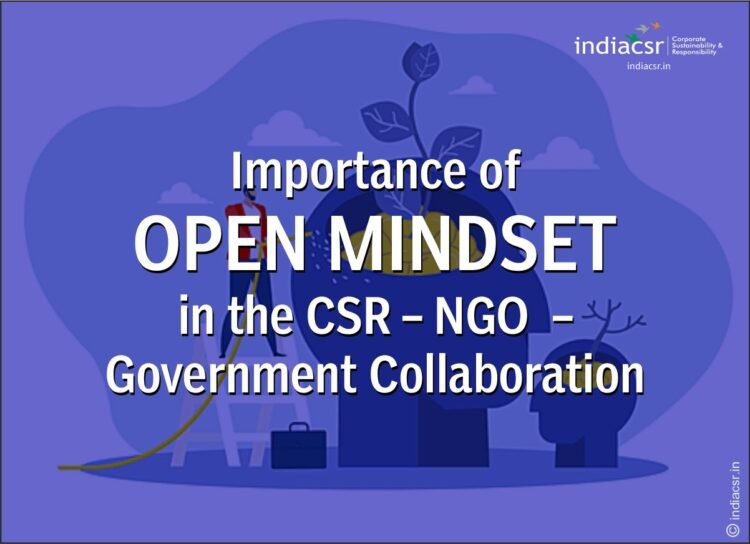
Corporate Social Responsibility (CSR) is considered one of the main pillars contributing to the development initiatives in India. The initiatives of many corporates as a response to the COVID pandemic also has contributed to how the various stakeholders, including the Government, are looking at CSR initiatives. We are seeing a radical shift in how the Government encourages and engages with corporates to complement the various Government initiatives towards sustainable development. On the other hand, the new changes and the emphasis on compliance and utilization are also being streamlined, which should be looked at positively rather than looking at these as a barrier.
The Flip Side: Balancing Compliance and Impact in CSR
The flip side of this conversation is whether the conversations are tilting too much towards the compliance requirements and utilization pressures, thereby diluting the conversations around IMPACT and Sustainable development’. There is also a thought that crosses our minds ‘whether the exploratory mindset in trying out unique development initiatives is also getting diluted’.
The Challenge of Defining and Measuring Impact
There may be many counter-thoughts on this. All the concerned stakeholders need to understand the larger objectives of the interventions and be clear on what they would want to see as a change together. The Impact Vs Reach debate is a long-standing and never-ending debate in the sector. The understanding of the word Impact is very loose, and hence there is always a thin rope that we walk on trying to balance the thought process from both sides. There is always this risk of a great idea of development not being taken up because the cost per beneficiary is high. Unfortunately, a lot of conversations start with the question of “How many beneficiaries?” rather than asking “Why and How of the idea”? The complexity of the question increases when the word impact is added to it.
Reluctant Impact: Shift Towards Compliance and Reach
If you were to ask me if this shift towards compliance and utilisation has impacted the thought process of the sector, my answer would be a reluctant YES. It is increasingly becoming difficult to secure funds for interventions that are unique and for those which do not have a proven prototype. Most of the donors want to see tangible change within the financial year. Hence, there is no place for any sort of ‘experiments or exploratory components’ in the initiatives presented. Every donor wants to have a frozen and defined framework with absolute target numbers (indicators), which is forcing the sector to only look at those initiatives where outputs are considered as impact. Hence, the word IMPACT is increasingly getting replaced by REACH.
Challenges in Gaining Traction for Behavior Change Initiatives
Initiatives that require more feet on the ground and involve aspects of behaviour change are not getting traction as these cannot be shown to their stakeholders and requires long term effort and patience even though the importance of such initiatives is justified and, to a large extent, understood as well.
So what is required now? The most important thing at this juncture of radical changes in the CSR-NGO – Government collaboration space is for all parties to have an open mindset and conversation and develop a balanced strategy for implementing projects. These are my suggestions:
- NGOs should invest in upskilling themselves to demonstrate high values associated with legal compliance and standards, which is one of the top requirements from the side of the corporate donor. This means investing in relooking at all the policies and regulations related to compliance and ethical practices on the ground aligned to the requirements of the corporate sector
- All the NGOs and implementing partners should start looking at an effective DATA BASED approach to all the initiatives. This applies to any sort of conventional, transactional, or experimental project. The skill of identifying the data that could substantiate the thought is extremely crucial. A fine balance between the emotional connection being backed up with data is extremely important.
- The conversations between the donor and the NGOs should start with discussing CONCEPTS AND IDEAS and not with ACTIVITIES. The nature of conversations should be more open rather than starting with a REQUIREMENT AND RESPONSE nature.
- As we see more corporates designing or refining their CSR strategies, it will be very beneficial to add a small percentage of the funds for the ‘research and exploratory’ kind of initiatives. This is extremely important as there is a possibility of reaching the threshold very soon regarding interventions.
- Finally, the NGOs and the corporates should balance DEEP REACH and WIDE REACH. This would satisfy the larger objective of creating a sustainable impact and reaching out to more stakeholders. A few projects with a long-term sustainable and defined impact and a few projects which are short-term responses or outcome-based should be the focus for the future.
I would like to conclude that DEVELOPMENT is an inclusive phenomenon that requires a straight line of thought from the Government, NGOs, and the donor community. This line of thought is only possible when there is a clear and synergized understanding of each other’s thoughts and all the stakeholders complement each other.
“An open mindset built on the foundation of mutual trust and respect is the need of the development sector to realize the vision of sustainable development”.
About the Author
Sriram Ananthanarayanan, Director (Projects), United Way Bengaluru on NGO – Government collaboration in CSR.







